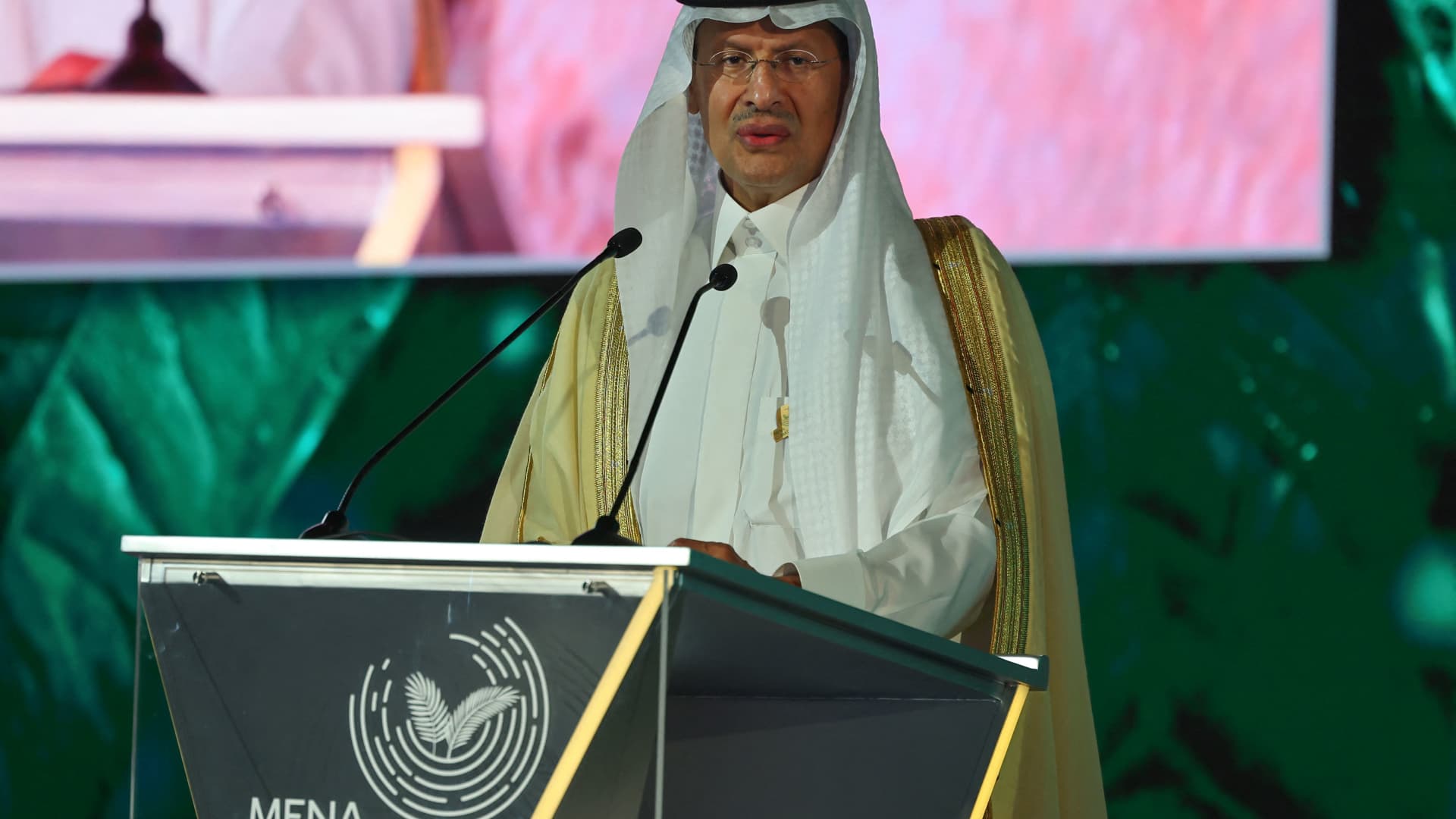The influential Saudi and Russia-led oil producers’ alliance is preventively prepared to wait months for guidance from “real numbers” before adjusting policies amid price volatility in the crude market, the Saudi energy minister said Sunday.
“Yes, we may be delayed with a decision on what to do, but I would not forfeit the precautionary approach, even if it goes beyond a month or two, or three or four months, or five months,” Prince Abdulaziz bin Salman told CNBC’s Dan Murphy on the sidelines of the MENA Climate Week in Riyadh.
The Riyadh-headed Organization of the Petroleum Exporting Countries and their non-OPEC allies, together known as OPEC+, last October agreed and have since upheld a decision to remove 2 million barrels per day of production from the oil market. Since then, some OPEC+ members have implemented additional voluntary declines outside of group decisions, with a roughly 1.66 million-barrels-per-day cut stretching until the end of 2024, and with Saudi Arabia and Russia respectively lowering their supplies by an additional 1 million barrels per day and 300,000 barrels per day until the end of this year.
A technical OPEC+ committee, the Joint Ministerial Monitoring Committee, convened Oct. 4 to review market fundamentals and individual country compliance with production obligations. It concluded its assembly without calling for an emergency ministerial meeting to adjust output strategy.
Asked whether the group might need to entertain further coordinated production action to maintain market stability at the start of 2024, Prince Abdulaziz said: “We hope we should not,” but stressed, “Don’t you ever discard what OPEC+ can do for the purpose of attending to this market.”
The recent supply crunch and recoveries in demand initially propped up prices near $95 per barrel, but recently once more tumbled on macro-economic concerns spurred by a high interest rate environment. Oil prices have been a key contributor to global inflation since Moscow’s full-scale invasion of Ukraine, especially in Europe and G7 countries, where consumers have lost access to sanctioned Russian barrels.
Further weighing on prices, the Paris-based International Energy Watchdog last month predicted that demand for oil, gas and coal will peak by 2030 — triggering vocal objections from OPEC, whose officials have repeatedly and controversially advocated for simultaneous investment in fossil fuels and renewable supplies in order to avoid short-term energy shortages.
“We want to demonstrate to the world that we are going to be using every source of energy,” Prince Abdulaziz reiterated on Sunday, noting that the kingdom is “dead serious about attending to the issue of climate change. We’re not the naysayer. In fact, we have a conviction that the science is saying that it is there and we have to attend to it.”
The energy transition commitment of OPEC+ countries — including of group member the United Arab Emirates, which will host the COP28 conference that kicks off in late November — has been heavily criticized because of the high carbon emissions generated by the production and consumption of fossil fuels.
Conflict impact
Observers are following the market open to see which way oil futures prices turn, following two days of renewed turbulence in the Middle East, where Palestinian militant group Hamas launched a lethal and decisive attack against Israel that claimed at least 600 Israeli lives at the time of writing, according to official Israeli communications. The hostilities took place a day after the 50th anniversary of the fourth Arab-Israeli war. Critically for crude markets, the offensive of 1973 led to a global energy crisis, resulting from an embargo of Saudi-led Arab oil producing nations — which back the Palestinian cause — against the U.S. for supporting Israel.
The latest conflict erupts at a high-stakes point in Middle Eastern diplomacy, after months of the U.S. doggedly pushing for a normalization of ties between Israel and Saudi Arabia — who earlier this year resumed relations with arch-rival Iran, historically a supporter of Hamas.
Asked on whether OPEC+ has the toolkit to address the latest Israeli-Hamas escalation, Prince Abdulaziz deferred comment to the Saudi foreign ministry, but stressed that the oil producers’ alliance “dealt with the ups and we’ve dealt with the downs” of global challenges, including the Covid-19 pandemic.
“I honestly believe that the best thing I could say is that the cohesion of OPEC+ should not be challenged. We’ve been through the worst, I don’t think we will have to go through any terrible situation at all,” he added.
